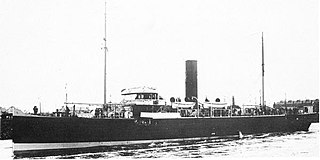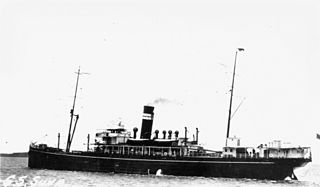Career
When McNeely was 17 he started working as a teacher until 1902. In 1903, he became a rural mail carrier. McNeely started studying law under Judge James C. MacRae and was admitted to the bar in 1907, at Monroe, North Carolina. In 1907, he also served as the City Clerk, in Monroe, and then as Treasurer in 1908.
In 1909, McNeely was elected to represent Union County, in the North Carolina House of Representatives. He only served one two-year term. During this time, he earned his Bachelor of Laws degree from the University of North Carolina. He was next elected, in 1914, to the North Carolina Senate to represent the 23rd district.
In January 1915, McNeely took an examination for appointment to the US Consular Service and passed. He was appointed the American Consul at Aden on October 18, 1915.

Q-ships, also known as Q-boats, decoy vessels, special service ships, or mystery ships, were heavily armed merchant ships with concealed weaponry, designed to lure submarines into making surface attacks. This gave Q-ships the chance to open fire and sink them. The use of Q-ships contributed to the abandonment of cruiser rules restricting attacks on unarmed merchant ships and to the shift to unrestricted submarine warfare in the 20th century.
HMS Mallow was an Acacia-class sloop built for the Royal Navy, and later operated by the Royal Australian Navy (RAN) as HMAS Mallow.

Montfort Stokes was an American Democratic politician who served as U.S. Senator from 1816 to 1823, and the 25th Governor of North Carolina from 1830 to 1832.

William Alden Smith was a U.S. Representative and U.S. Senator from the state of Michigan. After the 1912 sinking of the Titanic, Smith chaired the Senate hearings into the disaster. His report led to major reforms in maritime safety.

SS Persia was a P&O passenger liner, built in 1900 by Caird & Company, Inverclyde, Greenock, Scotland. It was torpedoed and sunk without warning on 30 December 1915, by German U-boat U-38.

SM U-35 was a German U 31-class U-boat which operated in the Mediterranean Sea during World War I. It ended up being the most successful U-boat participating in the war, sinking 220 merchant ships for a total of 505,121 gross register tons (GRT).
More than 1,500 African American officeholders served during the Reconstruction era (1865–1877) and in the years after Reconstruction before white supremacy, disenfranchisement, and the Democratic Party fully reasserted control in Southern states. Historian Canter Brown Jr. noted that in some states, such as Florida, the highest number of African Americans were elected or appointed to offices after the end of Reconstruction in 1877. The following is a partial list of notable African American officeholders from the end of the Civil War until before 1900. Dates listed are the year that a term states or the range of years served if multiple terms.

Richmond Mumford Pearson, Jr. was an American diplomat and member of the U.S. House of Representatives from North Carolina.

The Speaker of the North Carolina House of Representatives is the presiding officer of one of the houses of the North Carolina General Assembly. The Speaker is elected by the members of the house when they first convene for their regular session, which is currently in January of each odd-numbered year. Perhaps the most important duty of the Speaker is to appoint members and chairs of the various standing committees of the House.

Karl Howell Behr was an American tennis player and banker. He was also a survivor of the sinking of RMS Titanic.
Duncan Stewart was a veteran of the American Revolutionary War, slave owner, frontiersman, and politician. He holds the very rare distinction of having served three separate states state legislatures over his life, in North Carolina, Tennessee, and Mississippi.

The Mediterranean U-boat Campaign in the Mediterranean Sea was fought by Austria-Hungary and German Empire against the Allies during World War I. It was characterised by the ability of the Central Powers to raid with near impunity during the first years of the war, causing substantial shipping losses, until the introduction of the convoy system allowed the Allies to drastically cut their losses from 1917 on.

The U-5 class was a class of three submarines or U-boats that were operated by the Austro-Hungarian Navy before and during World War I. The class was a part of the Austro-Hungarian Navy's efforts to competitively evaluate three foreign submarine designs.

SM U-21 was a U-boat built for the Imperial German Navy shortly before World War I. The third of four Type U-19-class submarines, these were the first U-boats in German service to be equipped with diesel engines. U-21 was built between 1911 and October 1913 at the Kaiserliche Werft in Danzig. She was armed with four torpedo tubes and a single deck gun; a second gun was added during her career.

An armed boarding steamer was a merchantman that the British Royal Navy converted to a warship during the First World War. AB steamers or vessels had the role of enforcing wartime blockades by intercepting and boarding foreign vessels. The boarding party would inspect the foreign ship to determine whether to detain the ship and send it into port or permit it to go on its way.

Robert Williams was Governor of the Mississippi Territory from 1805 to 1809.
SS R. Ney McNeely was a Liberty ship built in the United States during World War II. She was named after R. Ney McNeely, a State Representative in North Carolina, a member of the North Carolina Senate, a later the American Consul in Aden.
SS Cornelia P. Spencer was a Liberty ship built in the United States during World War II. She was named after Cornelia Phillips Spencer, an influential writer and journalist in North Carolina during the Reconstruction era.

Agwilines Inc was a passenger and cargo shipping company of New York City. Agwilines is short for Atlantic, Gulf & West Indies Steamship Inc. AGWI Lines group operated four main lines in the 1910s, 1920s and 1930s:
This page is based on this
Wikipedia article Text is available under the
CC BY-SA 4.0 license; additional terms may apply.
Images, videos and audio are available under their respective licenses.















